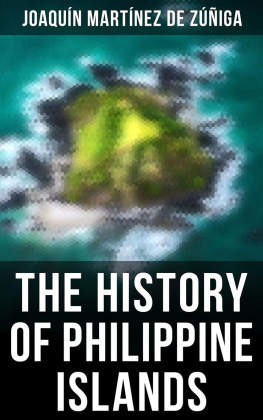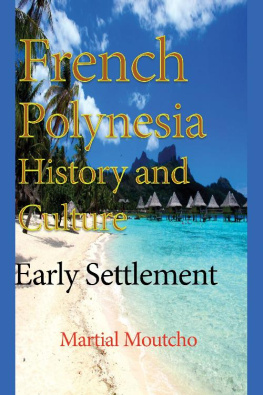Edited and annotated by Emma Helen Blair and James Alexander Robertson with historical introduction and additional notes by Edward Gaylord Bourne .
Contents of Volume XXI
- 9
- . Miguel Garca Serrano, and others; 15741624 19
- . [Unsigned and undated; 1624?] 79
- . Alvaro de Messa y Lugo, and others; Manila, July 23August 5 84
- . Miguel Garca Serrano; Manila, August 15 95
- . Felipe IV; Madrid, AugustDecember 98
- . Andrs de San Nicolas, Luis de Jess, and Juan de la Concepcin. (Extracts from their respective works, covering the history of the missions to the year 1624.) 111
- 319
Illustrations
- Title-page of Historia general de los religiosos descalzos ... del gran padre ... San Augustin, by Andres de San Nicolas (Madrid, 1664); photographic facsimile from copy in library of Edward E. Ayer, Chicago. 109
- Title-pages (the first engraved) to Historia general de los religiosos descalzos ... del gran padre ... San Augustin, by Luis de Jess, Augustinian Recollect (Madrid, 1681); photographic facsimiles from copy in library of Edward E. Ayer, Chicago. 187, 189
- Title-page of volume iv of Historia general de Philipinas, by Juan de la Concepcin, Augustinian Recollect (Manila, 1788); photographic facsimile from copy in library of Harvard University. 261
Preface
This volume, dated 1624, is entirely devoted to religious matters, ecclesiastical or missionary in their scope. The current documents for that year are concerned with conflicts between the diocesan authorities and the religious orders, and between the civil and religious authorities in Manila; the defeat by the Audiencia of the late Governor Fajardos attempt to found a seminary for the training of Japanese missionaries to be sent to labor in their own country; and efforts by the Spanish government to check the assumptions of the religious orders. Then follows a historical account of the early Recollect missions in the islands, down to the year 1624, compiled from the works of Andrs San Nicolas, Luis de Jess, and Juan de la Concepcin.
A document entitled Ecclesiastical affairs in the Philippines contains letters, decrees, etc., bearing on this subject, dated from 1574 to 1624. Instructions to Gomez Perez Dasmarias (1574) jealously restrict to the crown or its officials all exercise of the royal patronage; and give minute details of the course to be pursued by the governor and the provincials of the religious orders in matters where that right is involved. This is followed by various official documents issued in the controversy between Archbishop Serrano and the religious orders (162224) regarding the right claimed for archbishop and bishops to exercise the same jurisdiction and authority over the religious of the orders, when charged with the care of souls, as over the secular clergy. Serrano fortifies his position by various royal decrees and papal bulls. These documents show that much laxity has prevailed in selecting missionaries for the Indians, some of these teachers not even knowing the language of the natives to whom they minister; also that the friars claim even greater authority over their parishioners than that exercised by the archbishop and bishops in whose dioceses their missions are located. On June 20, 1622, the archbishop begins his official visit in the parish of Dilao (near Manila); and his edict announcing this calls upon the people of the parish to bring to him any complaints or information that they may have regarding any fault, illegal act, or neglect of duty in their cura or parish priest. Fray Alonso de Valdemoro was then in charge of the Dilao mission; refusing to obey the archbishops commands, he is excommunicated by the latter, and sentenced to imprisonment in a monastery. But the Audiencia refuse to support the archbishop, who accordingly writes a letter to the king complaining of the resistance made by the friars. Felipe IV, in a decree dated August 14, 1622, orders that the missions in the Philippines shall be subject to the provisions of another decree (issued June 22 of the same year) promulgated for the missions in Nueva Espaa. This provides that the same procedure be followed therein as in the missions of Peru; that the missions remain in charge of the orders, but that hereafter the religious be not placed in charge of missions; that they shall be subject to the archbishop in matters pertaining to the churches and the care of souls, but that anything relating to the personal character of such priest shall be privately referred to his superior in the order, who shall try and correct him.
An unsigned and undated document (1624?) gives an interesting account of a conflict between the civil and religious authorities in Manila over the question of a criminals right to asylum in a church. It is decided, at least for the time, in favor of the ecclesiastical authorities.
At the death of Governor Fajardo (July 11, 1624) the Audiencia take charge of the government. One of their first measures is to revoke the grant made not long before by Fajardo of certain monopolies to a seminary founded by him for educating Christian Japanese to go as ordained missionaries to their own country. The members of the Audiencia claim that this was an ill-timed act, in view of the persecution of Christians in Japan, and the edicts of its ruler expelling Spaniards from his realm, and forbidding his subjects to trade with them. Moreover, the seminary building is being erected in a place selected in violation of a royal decree, and which has been arbitrarily seized from its owners; and the monopolies granted are a grievance and injury to many persons, especially to the Indians who reside near Manila. The Audiencia accordingly revoke these, and order that the seminary building be demolished; and they issue a royal decree in accordance with this decision.
In a letter dated August 15, 1624, Archbishop Serrano advises the king either to give more power and authority to the Audiencia, or to suppress it. In the latter part of the same year the king issues some decrees affecting the religious in the islands. The first (dated August 30) cites earlier decrees regulating the privileges and jurisdiction of the religious, and orders that these be strictly observed. In a letter to the archbishop of Manila (dated October 8), Felipe gives some directions regarding the religious orders. A letter (dated November 27) to the Dominican provincial enumerates various abuses practiced toward the Indians by the friars of that order, and directs him to see that these be corrected.
An interesting chapter of ecclesiastical history is provided in the accounts of the early Recollect missions in the islands. These are selected from the printed works here named: Historia general de los religiosos descalzos del orden de San Avgvstin, by Andrs de San Nicolas (Madrid, 1664), and the second part of the same work, by Luis de Jess (Madrid, 1681); and Historia general de Philipinas, by Juan de la Concepcin (Manila, 1788). From all these books we select, as has been already announced, only such portions as closely concern our subject, and such as contain information of special value, or which is otherwise not accessible.






